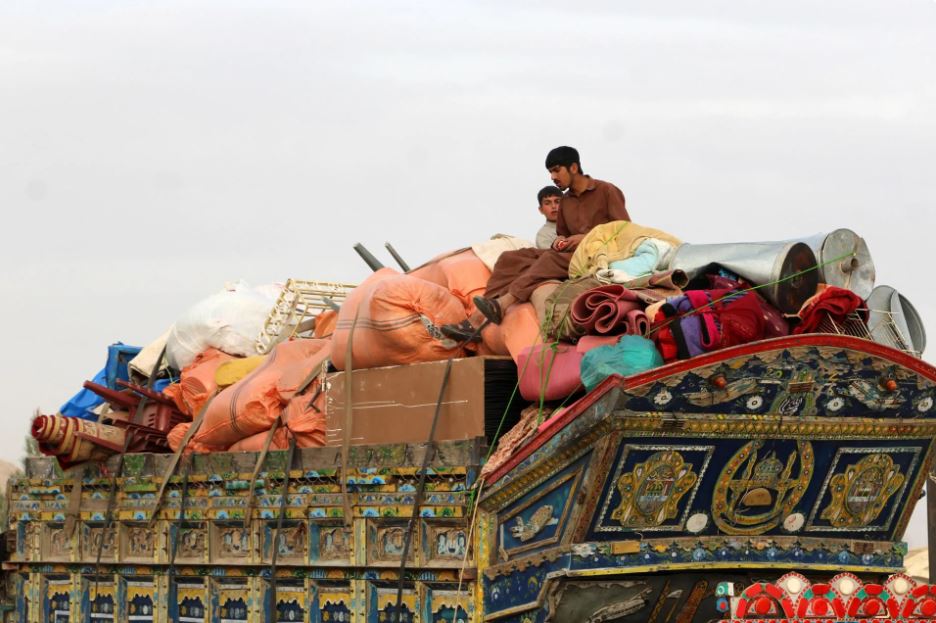The federal government has officially ordered the closure of all Afghan refugee camps in Khyber Pakhtunkhwa (KP), ending a 40-year chapter that began with the Soviet invasion of Afghanistan.
The directive, issued by the Federal Ministry of States and Frontier Regions (SAFRON), instructs all Afghan refugees to leave immediately and calls for the transfer of land and assets to the provincial administration.
According to the notification, 28 camps across the province will be de-notified and vacated. The list includes 8 in Peshawar, 3 in Nowshera, 5 in Hangu, 4 in Kohat, 2 in Mardan, 2 in Swabi, 1 in Buner, and 3 in Dir. District administrations have been told to ensure full compliance, while the Commissionerate for Afghan Refugees (CAR) will oversee the handover of land and immovable assets to the Khyber Pakhtunkhwa government or respective Deputy Commissioners.
Also Read: Afghan refugees return accelerates amid crackdown preparations
This decision is not merely administrative—it marks the end of an era that began when millions of Afghans fled across the border after the fall of President Sardar Daud’s government and the rise of Noor Muhammad Taraki’s socialist regime. The 1978 Saur Revolution, backed by Moscow, quickly spiraled into chaos as infighting, purges, and assassinations shook the Afghan leadership. When Soviet tanks rolled across the Amu River with Babrak Karmal on board, Afghanistan’s turmoil spilled into Pakistan.
Temporary camps were set up overnight in the dusty plains of Khyber Pakhtunkhwa and Balochistan. The United Nations High Commissioner for Refugees (UNHCR), supported by Western nations, stepped in to fund and manage the crisis. But amid the chaos, registration loopholes allowed families to enroll in multiple camps, collecting rations and aid from several sources. What began as humanitarian relief soon turned into a complex web of dependency and exploitation.
Also Read: Peshawar High Court halts deportation of 51 afghan refugees families
Over the years, Afghan migrants became part of Pakistan’s economic fabric. They worked in construction, transport, and trade, often competing with local labor. The failure to restrict their movement beyond camp boundaries bred resentment among local populations. Many remember the 1980s when, under General Zia-ul-Haq’s informal orders, police were discouraged from registering cases against Afghan nationals—even for serious crimes like theft and murder.
Those were also the years when heroin and Kalashnikovs flooded Pakistan. Entire generations grew up watching the rise of drug addiction and gun culture, both of which found roots in the shadow economy surrounding refugee settlements. The story of the camps is, in many ways, the story of how conflict reshaped Pakistan’s streets and psyche.
Also Read: Afghan Transit Trade suspended as Pakistan orders offloading of containers
As decades passed, Afghan nationals wove themselves into the country’s institutions. Thousands secured national identity cards and passports, purchasing land and establishing businesses. Some traveled abroad using Pakistani documents, and when their true identities were exposed, the embarrassment came back to haunt Pakistan. Recent deportations from multiple countries underscored how deep this issue runs.
Repeated deadlines for repatriation came and went. Governments hesitated, citing humanitarian concerns and unstable conditions in Afghanistan. But with the Taliban’s return to power and relative calm in Kabul, Islamabad’s patience appears to have run out. The government now seems determined to ensure complete repatriation—this time without extensions or delays.
Also Read: Pakistan-Afghanistan tensions escalate amid cross-border clashes
Still, challenges remain. Reports suggest that many Afghan families expelled from other provinces have regrouped in Akora Khattak, setting up makeshift camps of their own. The silence of law enforcement agencies has raised questions about how strictly this policy will be enforced.
The closure of Afghan refugee camps in Khyber Pakhtunkhwa is more than a policy decision—it is a historical reckoning. For forty years, Pakistan shouldered the burden of one of the world’s largest refugee populations, a gesture rooted in faith and fraternity. But compassion gave way to fatigue. What began as hospitality now ends as a demand for reclamation—of land, order, and national identity.
The story of Afghan refugee camps in Khyber Pakhtunkhwa is not just about those leaving; it is also about what remains behind—memories, scars, and a complicated bond between two nations that share borders, bloodlines, and battles.












